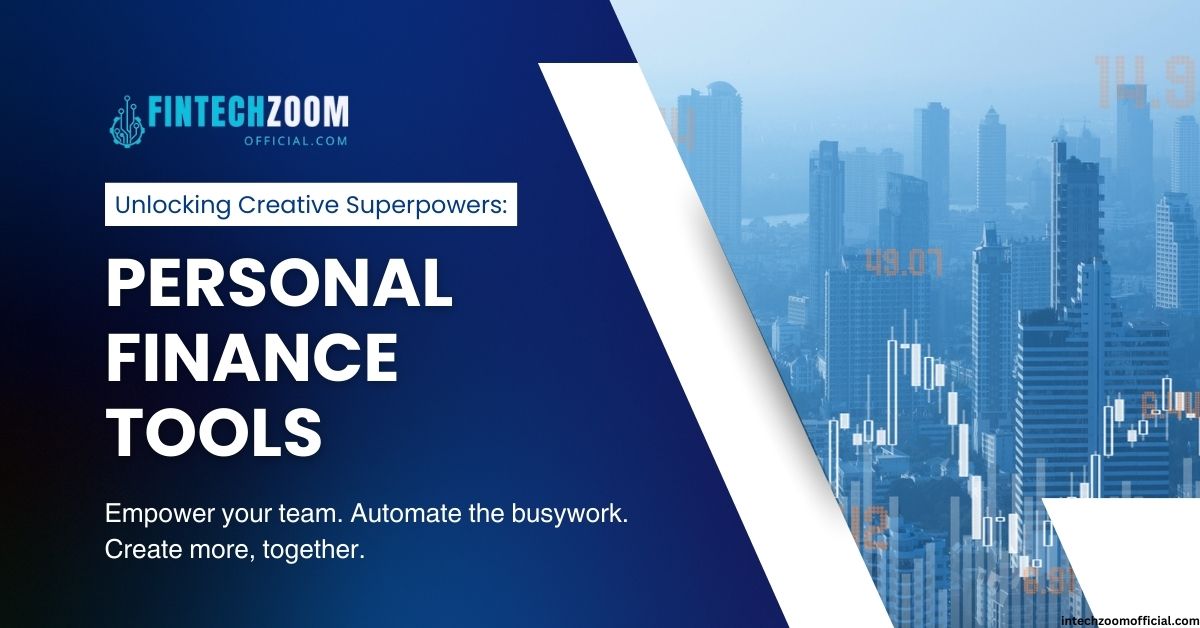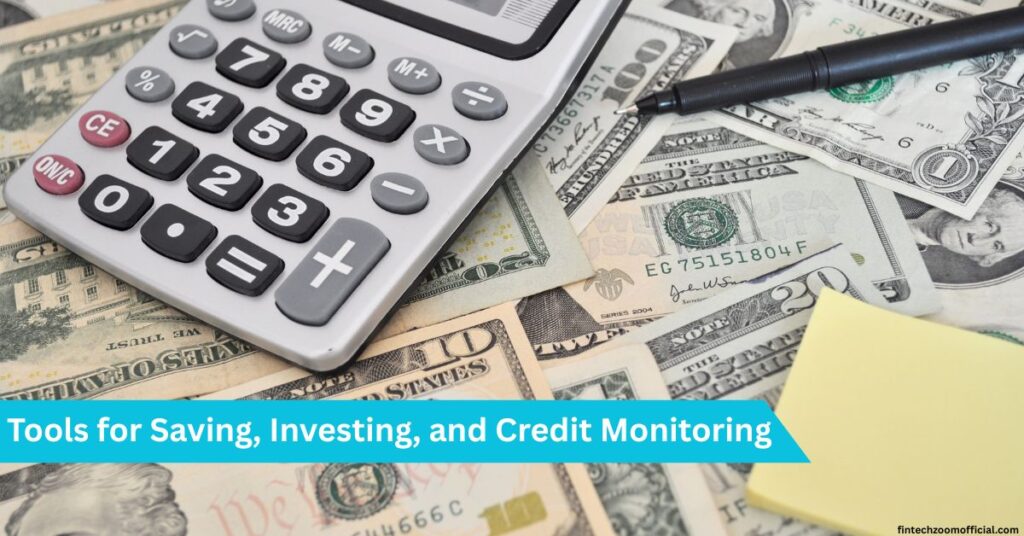FintechZoom.com | Your Gateway to Financial Insights
- Home
-
Stocks Updates
- News
-
Finance Tools
- Crypto Profit Calculator
- Savings Goal Calculator
- Compound Interest Calculator
- Currency Converter
- Tax Calculator
- Retirement Planner
- Net Worth Tracker
- Investment Portfolio Calculator
- Credit Card Payoff Calculator
- Monthly Budget Planner
- Mortgage Affordability Calculator
- Debt-to-Income (DTI) Ratio Calculator
- Fuel Cost Calculator
- Stock Return Calculator
- Loan EMI Calculator
- Latest Blogs
- Jobs Updates
Top Personal Finance Tools to Manage Your Money Smartly in 2025
 Top Personal Finance Tools to Manage Your Money Smartly in 2025
Top Personal Finance Tools to Manage Your Money Smartly in 2025Table of Contents
Personal finance tools are playing an increasingly important role in how individuals approach money management in 2025. With rising costs and digital integration into daily routines, these tools simplify complex financial decisions. Whether it’s tracking your monthly expenses or creating a long-term savings plan, the tools available today offer functions suited for every user type. At fintechzoomofficial.com, we explore how these tools work, why they matter, and which ones perform best.
Table of Contents
- Table of Contents
- Definition and Features
- Benefits of Using Digital Finance Tools
- Why Personal Finance Tools Are Popular in 2025
- Choosing the Right Tool for Your Needs
- What to Consider Before Picking a Tool
- Free vs Paid Finance Tools
- How fintechzoomofficial.com Helps You Decide
- Best Budgeting Tools in 2025 (Updated List from fintechzoomofficial.com)
- Extended List of Popular Budgeting Apps
- Additional Financial Tools Worth Considering
- Online Financial Calculators
- Extra Financial Tools That Add Value
- Tools for Saving, Investing, and Credit Monitoring
- Saving Tools and Auto-Saving Apps
- Investing Assistants and Robo-Advisors
- Credit Score and Monitoring Tools
- How to Use These Tools Effectively
- Creating Your First Budget with a Finance Tool
- Automating Payments and Goals
- Analyzing Reports and Improving Habits
- Real-Life Examples and Success Stories
- How a Student Managed Budget with YNAB
- Family of Four Using PocketGuard for Monthly Planning
- Small Business Owner Using fintechzoomofficial.com Tools
- Comparison Table of Top Tools
- Budgeting Tools: Feature-by-Feature
- Which Tool Is Right for Each Type of User
- Exclusive Tips from fintechzoomofficial.com
- Final Thoughts and Next Steps
- Our Recommendation Based on Goals
- How fintechzoomofficial.com Supports Your Journey
- Downloadable Resources and Where to Start
- FAQs About Personal Finance Tools
- What are personal finance tools and how do they work?
- Are personal finance tools safe for my bank information?
- Can I use personal finance tools without linking my bank?
- Which personal finance tools are best for beginners?
- Are there any free personal finance tools that actually help?
- Do personal finance tools support multiple currencies?
- What is zero-based budgeting in personal finance tools?
- How do personal finance tools help with saving money?
- Can personal finance tools help manage debt?
- Are personal finance tools useful for small businesses?
- What are envelope budgeting tools?
- How often should I check my personal finance tools?
- Can personal finance tools help track shared expenses?
- What if I have irregular income—are personal finance tools still helpful?
- How does fintechzoomofficial.com choose the best personal finance tools?
Definition and Features
Personal finance tools refer to apps and software designed to support budgeting, saving, goal setting, and financial forecasting. They sync with your bank accounts, categorize your transactions, and present a real-time overview of your spending and savings. Some tools offer detailed charts and reporting, while others prioritize automation or simplicity.
Benefits of Using Digital Finance Tools
Using these tools can help establish better money habits. By getting daily or weekly insights, users begin recognizing patterns that influence financial decisions. Whether you’re a student watching your monthly allowance or a family looking to manage multiple incomes, these tools remove guesswork and create more clarity.
Why Personal Finance Tools Are Popular in 2025
In 2025, users expect more from their financial apps. AI-generated forecasts, subscription management, and integrated savings goals are now standard. The growth in remote work and freelance income also means that people are relying more on digital platforms to bring all their finances under one dashboard.
Choosing the Right Tool for Your Needs
Choosing the right personal finance tool means balancing your financial goals with usability. Some users prefer hands-on tools that allow full customization, while others want automation that requires little manual input. On fintechzoomofficial.com, we provide comparisons and recommendations based on user lifestyle.
What to Consider Before Picking a Tool
Start by defining your financial goals. Are you paying down debt, building savings, or just trying to track your expenses? Consider factors like interface design, integration with your bank, pricing structure, and customer support. Choose tools that simplify rather than complicate your routine.
Free vs Paid Finance Tools
While free apps are helpful for basic tasks, such as expense tracking and simple budget categories, paid apps often include detailed forecasting, automated savings, or multi-account syncing. It’s not always about how much you pay but how much value the tool brings to your daily habits.
How fintechzoomofficial.com Helps You Decide
Our site features detailed app reviews, user experiences, and side-by-side feature comparisons. We identify which tools are best for certain user groups: beginners, freelancers, couples, or those managing household expenses. fintechzoomofficial.com makes the selection process easier by removing confusion and offering practical insight.
Best Budgeting Tools in 2025 (Updated List from fintechzoomofficial.com)
Budgeting in 2025 isn’t limited to a few famous apps — there’s now a wide range of options for every financial style. Whether you want complete control or total automation, there’s a tool that fits. Below is a carefully organized list of popular budgeting apps, as featured and analyzed by fintechzoomofficial.com.
Extended List of Popular Budgeting Apps
- Quicken – Comprehensive finance software that covers personal, investment, and small business finances
- Mint – Connects to accounts and auto-categorizes spending, ideal for casual users
- YNAB (You Need a Budget) – Zero-based budgeting that helps give every dollar a job
- PocketGuard – Tracks spending and shows what’s safe to spend after bills
- Monarch Money – Customizable budget planner with net worth and goal tracking
- Simplifi by Quicken – Mobile-first budget app with simple interface and smart planning tools
- Goodbudget – Based on the envelope system; manual but effective
- EveryDollar – Built around zero-based budgeting with a clean and intuitive interface
- Empower – Combines budgeting with investment tracking and retirement planning
- Personal Capital – Tracks spending and investments in one dashboard
- Moneydance – Traditional personal finance software with cross-platform support
- Lunch Money – Focuses on customization, multi-currency support, and budgeting goals
- Wallet by BudgetBakers – Budgeting, bank sync, and card storage in one app
- Albert – A hybrid budgeting app with saving, investing, and human advisors
- Spendee – Designed to make spending data visually easy to understand
- Honeydue – Helps couples track shared finances in real time
- Tiller – Links directly to Google Sheets or Excel for full control
- MoneyManager Ex – Free, open-source budgeting software ideal for offline tracking
Additional Financial Tools Worth Considering
While budgeting apps help manage cash flow, other tools can support planning, forecasting, and smarter decision-making. fintechzoomofficial.com also highlights tools that add value beyond monthly budgets.
Online Financial Calculators
- Bankrate Calculators – A full suite for loans, savings, and mortgage calculations
- Cut-back Calculator – Shows potential savings from reducing specific spending areas
- Savings Goal Calculator – Helps plan the amount and frequency needed to hit savings targets
- Retirement Planner – Estimates how much income you’ll need and how close you are to meeting retirement goals
Extra Financial Tools That Add Value
MoneyManager Ex – Lightweight, free alternative for managing accounts without cloud sync
Google Sheets & Microsoft Excel – Classic tools that let users customize budgets, reports, and spending charts
Credit Karma – Tracks your credit score for free and gives basic credit advice
Rocket Money – Helps cancel subscriptions and reduce bills with minimal effort
Acorns – Rounds up purchases and invests the difference into ETF portfolios
Trim – Automates bill negotiation and cancels unused services
Betterment – A robo-advisor that invests your savings based on goals and timelines
Mvelopes – Brings the envelope budgeting system into a modern app
Tools for Saving, Investing, and Credit Monitoring

Financial well-being extends beyond budgeting. In this section, fintechzoomofficial.com explores apps designed to help users grow savings, monitor credit, and start investing.
Saving Tools and Auto-Saving Apps
Tools like Qapital and Digit analyze your spending habits and automatically move small amounts into savings goals. These are ideal for people who find it hard to save consistently. Over time, small contributions lead to meaningful progress.
Investing Assistants and Robo-Advisors
Acorns invests spare change from purchases, while Betterment builds personalized portfolios with long-term growth in mind. These tools simplify investing for beginners by managing risk and allocation based on your goals.
Credit Score and Monitoring Tools
Keeping track of your credit health is now easier. Tools such as Credit Karma and Experian not only show your credit score but also provide tips to improve it. Regular alerts help users stay aware of changes to their credit reports.
How to Use These Tools Effectively
Downloading a tool is only the first step. At fintechzoomofficial.com, we guide users through setup, automation, and optimization to get the most out of their financial tools.
Creating Your First Budget with a Finance Tool
Start by syncing your financial accounts. Choose budget categories that reflect your lifestyle, like food, utilities, savings, and transport. Assign limits based on your income, and revisit weekly to make minor adjustments.
Automating Payments and Goals
Set up automatic transfers to your savings, or recurring payments for bills. Most tools also allow you to define financial goals—like paying off a loan or saving for a vacation—and track progress.
Analyzing Reports and Improving Habits
Review the monthly report your tool generates. Identify areas where spending exceeds targets or where savings could be increased. Adjust settings to alert you when you’re nearing limits.
Real-Life Examples and Success Stories
Real stories can motivate users to stay on track. fintechzoomofficial.com regularly features stories from people who transformed their financial lives using smart tools.
How a Student Managed Budget with YNAB
A university student began using YNAB to allocate their scholarship money. Within five months, they not only tracked every expense but saved enough for emergency needs. Their experience shows that even limited income can be managed well.
Family of Four Using PocketGuard for Monthly Planning
This family connected their joint accounts to PocketGuard, allowing both partners to stay informed. The app helped them adjust recurring bills and reduce grocery spending without needing spreadsheets.
Small Business Owner Using fintechzoomofficial.com Tools
After reading app reviews on fintechzoomofficial.com, a freelance designer chose Monarch Money. It offered forecasting tools that made it easier to handle quarterly taxes and irregular client payments.
Comparison Table of Top Tools
| Tool Name | Budgeting Method | Free Version | Platform Support | Key Features | Best For |
|---|---|---|---|---|---|
| Mint | Auto Categorization | ✅ Yes | Web, Android, iOS | Credit score tracking, alerts, bill reminders | Beginners, basic budgeting |
| YNAB | Zero-based budgeting | ❌ No (Free trial) | Web, Android, iOS | Goal setting, debt tracking, real-time sync | Serious budget planners |
| Monarch Money | Forecast-based budgeting | ❌ No | Web, Android, iOS | Net worth tracking, shared budgets, long-term planning | Families, freelancers |
| PocketGuard | AI-assisted suggestions | ✅ Yes | Web, Android, iOS | “In My Pocket” balance, linking multiple accounts | Couples, shared budgeting |
| Goodbudget | Envelope system | ✅ Yes | Web, Android, iOS | Manual entry, envelope-based planning | Manual budgeters, students |
| Mvelopes | Envelope system | ❌ No | Web, Android, iOS | Real-time sync, advanced envelope planning | Digital cash-flow control |
| Rocket Money | Subscription tracking | ✅ Yes | Web, Android, iOS | Finds/cancels subscriptions, budget insights | Cutting unnecessary expenses |
| PocketSmith | Calendar + forecast view | ✅ Limited | Web, Android, iOS | 30-year forecasts, scenario planning | Freelancers, irregular income |
| Qapital | Rule-based saving | ❌ No | Android, iOS | Automates savings based on rules | Passive savers |
| Acorns | Round-up investing | ❌ No | Android, iOS | Invests spare change into ETFs | Beginners in investing |
| Betterment | Robo-advisor investing | ❌ No | Web, Android, iOS | Personalized portfolio management | Long-term investors |
| Credit Karma | Credit tracking only | ✅ Yes | Web, Android, iOS | Free credit score reports and alerts | Monitoring credit health |
A visual comparison often helps more than words. fintechzoomofficial.com recommends the following layout for comparing tools:
Budgeting Tools: Feature-by-Feature
Use a table that compares tools based on their budgeting method, cost, mobile support, and key features like automation, credit monitoring, and investment tracking.
Which Tool Is Right for Each Type of User
Each user has different needs. Beginners may appreciate Mint, couples might enjoy Honeydue, while business owners prefer Monarch. Match tools based on lifestyle, goals, and budget style.
Exclusive Tips from fintechzoomofficial.com
Our team provides setup walkthroughs, FAQs, and tool-specific strategies. These help users skip trial-and-error and get results faster.
Final Thoughts and Next Steps
Money management is becoming more streamlined thanks to technology. With the right tools, you can control spending, grow savings, and plan for bigger goals.
Our Recommendation Based on Goals
Choose a tool that supports your lifestyle. Mint for basic budgeting, YNAB for structured planning, and Monarch for complete financial overviews. Use free trials to see what fits.
How fintechzoomofficial.com Supports Your Journey
We continue to publish updated guides, app reviews, and comparisons for every user type. fintechzoomofficial.com acts as your financial assistant by helping you make informed decisions.
Downloadable Resources and Where to Start
Get started with free budget templates, checklists, and comparison charts available at fintechzoomofficial.com. These resources are designed to help users take action from day one.
FAQs About Personal Finance Tools
FAQs About Personal Finance Tools
What are personal finance tools and how do they work?
Personal finance tools are digital apps or software that help manage money. They sync with your bank accounts, track expenses, and organize spending. Most offer visual breakdowns of your financial activity. These tools are ideal for setting monthly budgets and long-term savings goals. In 2025, many tools also include AI insights and alerts. You’ll find reviews of the best personal finance tools on fintechzoomofficial.com.
Are personal finance tools safe for my bank information?
Most personal finance tools use encrypted connections and read-only access. This means they can track transactions without allowing money transfers. Top apps follow strict security standards, like two-factor authentication. They also partner with major banks for secure data integration. Choosing trusted tools through fintechzoomofficial.com reduces risk. Safety is a key priority when selecting personal finance tools.
Can I use personal finance tools without linking my bank?
Yes, some personal finance tools offer manual entry options. Tools like Goodbudget let you input spending categories and update balances yourself. While this takes more effort, it gives full control. It’s useful for users who don’t want to sync accounts. fintechzoomofficial.com lists both manual and automatic tools. Manual options still help manage money effectively.
Which personal finance tools are best for beginners?
Mint, PocketGuard, and Qapital are great starting points. They’re easy to set up and guide users through basic budgeting. These personal finance tools have simple interfaces with helpful tips. Beginners benefit from automation and alerts to stay on track. fintechzoomofficial.com highlights beginner-friendly tools with user reviews. Start small and build habits gradually.
Are there any free personal finance tools that actually help?
Yes, many free tools provide strong features. Mint, Credit Karma, and EveryDollar offer budgeting, credit tracking, and spending alerts. These personal finance tools are useful without upgrading to premium plans. Free apps usually have fewer reports and integrations but still work well. fintechzoomofficial.com compares free vs paid tools in detail. Many users stick with free versions long-term.
Do personal finance tools support multiple currencies?
Some personal finance tools support global currencies and multi-country accounts. PocketSmith and Monarch Money are good for international users. This is especially helpful for freelancers or expats. Users can track conversions and categorize foreign spending easily. fintechzoomofficial.com includes details on currency support for each tool. Global compatibility is a growing feature in 2025.
What is zero-based budgeting in personal finance tools?
Zero-based budgeting assigns every dollar to a job. It’s a popular method supported by tools like YNAB and Goodbudget. These personal finance tools encourage users to plan ahead and reduce waste. You start fresh every month and adjust based on real income. fintechzoomofficial.com recommends YNAB for disciplined budgeting. This method improves money awareness over time.
How do personal finance tools help with saving money?
They track your spending patterns and suggest areas to reduce costs. Apps like Digit or Qapital move small amounts into savings automatically. Personal finance tools also allow setting visual goals, like vacation funds. They notify users when savings milestones are hit. fintechzoomofficial.com features tools that boost savings with less effort. Saving becomes more consistent through automation.
Can personal finance tools help manage debt?
Yes, many tools are designed to reduce and monitor debt. You can enter credit card balances, loans, and interest rates. Personal finance tools like Undebt.it or YNAB offer payoff plans. They help prioritize high-interest debt and track monthly progress. fintechzoomofficial.com includes tools that focus on debt freedom. Debt planning is easier when you track every step.
Are personal finance tools useful for small businesses?
Some personal finance tools work well for freelancers and solo business owners. Monarch Money and PocketSmith are good examples. They track irregular income, project taxes, and help plan expenses. These tools are different from full accounting software but still helpful. fintechzoomofficial.com includes business-use reviews of popular tools. They’re ideal for side income or freelance budgets.
What are envelope budgeting tools?
Envelope budgeting tools let you divide money into virtual categories. You assign fixed amounts for groceries, transport, bills, etc. Goodbudget and Mvelopes are top envelope-style personal finance tools. Once a category runs out, you stop spending in it. This builds better control and reduces impulsive buying. fintechzoomofficial.com includes a full review of envelope budgeting tools.
How often should I check my personal finance tools?
Weekly check-ins are ideal for most users. Reviewing spending and savings regularly keeps habits in control. Personal finance tools often offer daily or weekly alerts. Monthly overviews help adjust budgets or track progress toward goals. fintechzoomofficial.com recommends setting reminders to stay consistent. A few minutes each week improves money habits over time.
Can personal finance tools help track shared expenses?
Yes, several tools offer shared account tracking for couples or families. Apps like Honeydue or PocketGuard allow syncing joint spending. These personal finance tools make it easy to manage rent, bills, or grocery budgets together. Some tools even send reminders and spending limits. fintechzoomofficial.com lists tools built for collaboration. They reduce conflicts and keep household finances transparent.
What if I have irregular income—are personal finance tools still helpful?
Irregular income can be managed with the right tool. YNAB, Monarch, and PocketSmith help forecast income and smooth spending. These personal finance tools offer flexibility to change plans each month. They work well for freelancers, gig workers, or seasonal earners. fintechzoomofficial.com has dedicated reviews for tools that support irregular cash flow. Planning becomes more predictable with forecasting features.
How does fintechzoomofficial.com choose the best personal finance tools?
We research features, test usability, and gather user feedback. Each tool is evaluated for cost, value, security, and purpose. Our team at fintechzoomofficial.com also looks at updates and user support. Tools are categorized by experience level, goals, and device compatibility. This helps users find the best personal finance tools for their situation. All reviews aim to make decision-making easier.














No Comments